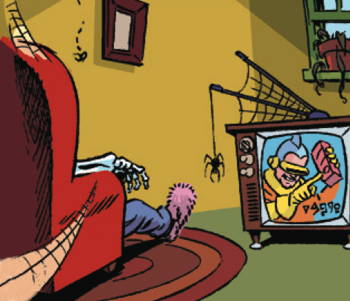September 2019
September 6, 2019
Scuffy Shew
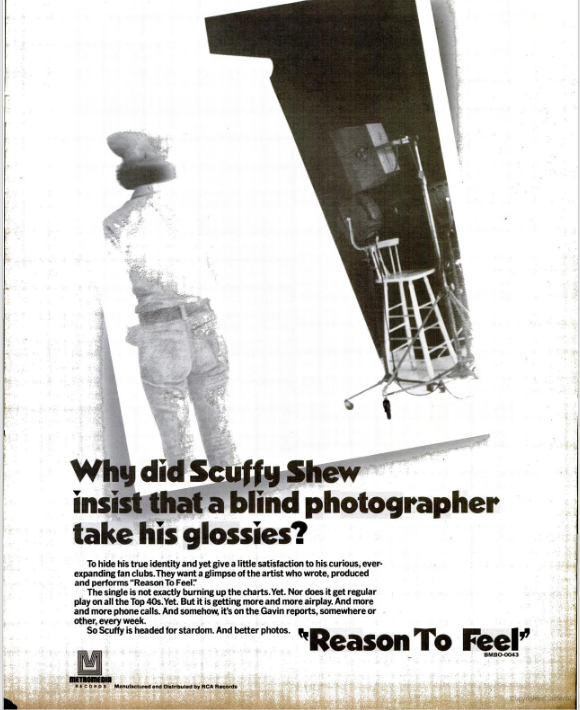
Posted By: Paul - Fri Sep 06, 2019 -
Comments (3)
Category: Ineptness, Crudity, Talentlessness, Kitsch, and Bad Art, Music, 1970s, Cacophony, Dissonance, White Noise and Other Sonic Assaults
September 5, 2019
King Vitaman Cereal
Because the Middle Ages were known for healthy eating.The Wikipedia page.
Posted By: Paul - Thu Sep 05, 2019 -
Comments (3)
Category: Food, Royalty, Stereotypes and Cliches, 1960s
Cheese Whey Wine
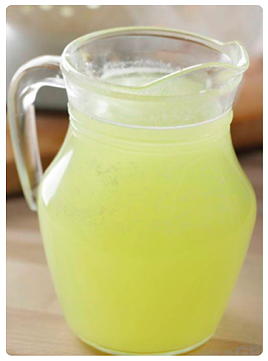
cheese whey
source: cheesemaking.com
One possibility was to dehydrate it into a protein powder that could be fed to livestock, or bodybuilders. But in the mid-1970s, researchers at Oregon State University hit upon a potentially more lucrative use: making wine out of whey. They detailed their study in a pamphlet titled “Utilization of Cheese Whey for Wine Production.”
The reason this was possible is because the lactose in whey will ferment, if one uses the right microorganisms. The end result was a whey wine that, according to the researchers, "was acceptable to a great majority of tasters, who preferred it slightly sweet.” Which doesn't sound exactly like a glowing recommendation. Nevertheless, the researchers were enthusiastic about the potential of whey wine:

It doesn't seem that their dream of raking in the big bucks with whey wine ever panned out. The idea of whey-based alcohol products is still kicking around, however. Various gins and vodkas made from whey can be found, such as Bertha's Revenge Irish Milk Gin or Sheep Whey Gin. But I can't find any wines being made from whey.
There's more info about whey-based spirits at SevenFifty.com, and here's an article about an effort to make whey beer.
Posted By: Alex - Thu Sep 05, 2019 -
Comments (1)
Category: Food, Inebriation and Intoxicants, 1970s, Alcohol
September 4, 2019
The Lice-Infested Underwear Experiment
During World War II, millions of men served their country by fighting in the military. Hundreds of thousands of others worked in hospitals or factories. And thirty-two men did their part by wearing lice-infested underwear.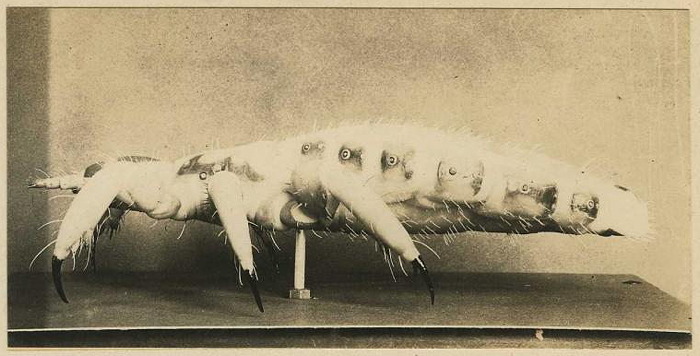
Model of a body louse, National Museum of Health and Medicine.
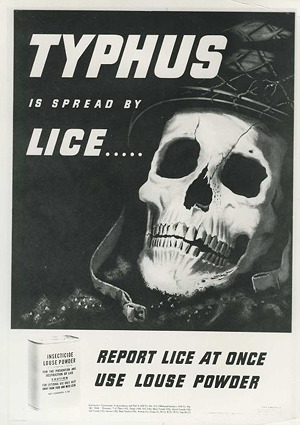
World War II public health warning
Source: Nat. Museum of Health & Medicine
In an attempt to prevent this, the Rockefeller Foundation, in collaboration with the federal government, funded the creation in 1942 of a Louse Lab whose purpose was to study the biology of the louse and to find an effective means of preventing infestation. The Lab, located in New York City, was headed by Dr. William A. Davis, a public health researcher, and Charles M. Wheeler, an entomologist.
The first task for the Louse Lab was to obtain a supply of lice. They achieved this by collecting lice off a patient in the alcoholic ward of Bellevue Hospital. Then they kept the lice alive by allowing them to feed on the arms of medical students (who had volunteered for the job). In this way, the lab soon had a colony of thousands of lice. They determined that the lice were free of disease since the med students didn't get sick.
Next they had to find human hosts willing to serve as subjects in experiments involving infestation in real-world conditions. For this they initially turned to homeless people living in the surrounding city, whom they paid $7 each in return for agreeing first to be infected by lice and next to test experimental anti-louse powders. Unfortunately, the homeless people proved to be uncooperative subjects who often didn't follow the instructions given to them. Frustrated, Davis and Wheeler began to search for other, more reliable subjects.
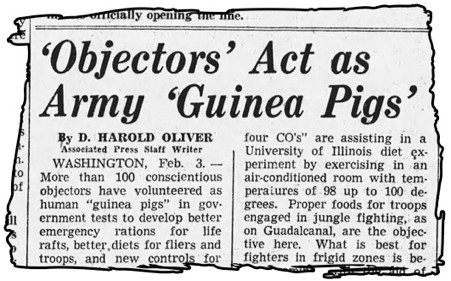
The Vancouver Sun - Feb 3, 1943
In theory, the COs were always given a choice about whether or not to serve as guinea pigs. In practice, it wasn't that simple. Controversy lingers about how voluntary their choice really was since their options were rather limited: be a guinea pig for science, or do back-breaking manual labor. But for their part, the COs have reported that they were often eager to volunteer for experiments. Sensitive to accusations that they were cowardly and unpatriotic, serving as a test subject offered the young men a chance to do something that seemed more heroic than manual labor.
Eventually COs participated in a wide variety of experiments, but Davis and Wheeler were the very first researchers to use American COs as experimental subjects. And they planned to infest these volunteers with lice.
More in extended >>
Posted By: Alex - Wed Sep 04, 2019 -
Comments (5)
Category: Health, Insects and Spiders, Experiments, Underwear, 1940s
1919 Cartoon “Hamlet”
Posted By: Paul - Wed Sep 04, 2019 -
Comments (0)
Category: Humor, Literature, Cartoons, 1910s
September 3, 2019
The MBAs - Born to Run Things
Describing themselves as “the world’s first pro-business rock ’n’ roll band,” the MBAs came out in 1982 with their first (and, I believe, only) album, titled Born to Run Things.It included songs such as "Inside Information," "Jesus H. Chrysler," "Good Old Boys Raising Keynes", and "Amortize It."
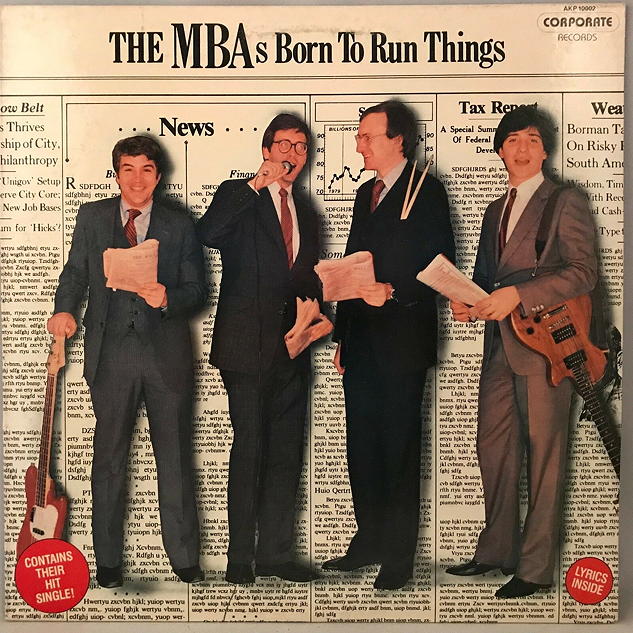
I can’t find any samples of their music online, but if interested you can pick up a vinyl copy of their album on eBay for $19.99.
In the absence of any of the actual music, here are the lyrics to "Bessy," described in the liner notes as “a rock ballad for Bethlehem Steel.”
Let me tell you that if you’re in doubt,
I’ll re-tool quickly, and we can iron things out,
Bessy,
I just want to be specific,
I’ll shun foreign interest
and things’ll be ‘tarrific’.
(CHORUS:) Bessy,
You can’t let your workers go,
Bessy,
You got to put up a fight,
Cause Bessy, I won’t let you throw
Steel away, steel away, steel away,
Into the night.
Bessy,
Productivity is dropping,
And even though I’m with you
it won’t all be Bliss and Laughlin.
Bessy,
You know I’m not here to condemn
The only thing I want from life
is to be your Star of Bethlehem.
Incidentally, their album is also for sale on Amazon, where it's clear that all 5 of the reviews for it have mistaken it for Bruce Springsteen's Born to Run.
More info: people.com
Posted By: Alex - Tue Sep 03, 2019 -
Comments (2)
Category: Business, Music, 1980s
The Handsome Little Devils
Okay, artists are often intentionally weird, but some are weirder than others.
Their home page.
Posted By: Paul - Tue Sep 03, 2019 -
Comments (1)
Category: Daredevils, Stuntpeople and Thrillseekers, Performance Art
September 2, 2019
Skippy and Hellmann’s
Odd partners in advertising: when Skippy and Hellmann's teamed up in 1963, claiming Together Tremendous!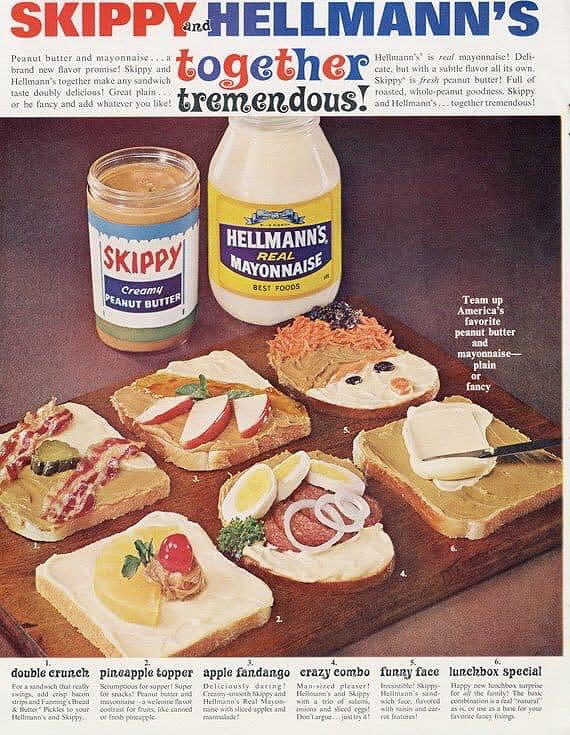
The recipes for those peanut butter/mayo sandwiches, enlarged:

Update: Astute readers noted that if this was a nationwide ad campaign, then the version of the ad that ran west of the Rockies should have referred to Best Foods mayonnaise, rather than Hellmann's. I checked, and it turns out this was exactly the case. It was an identical ad, but with Best Foods substituted for Hellmann's.
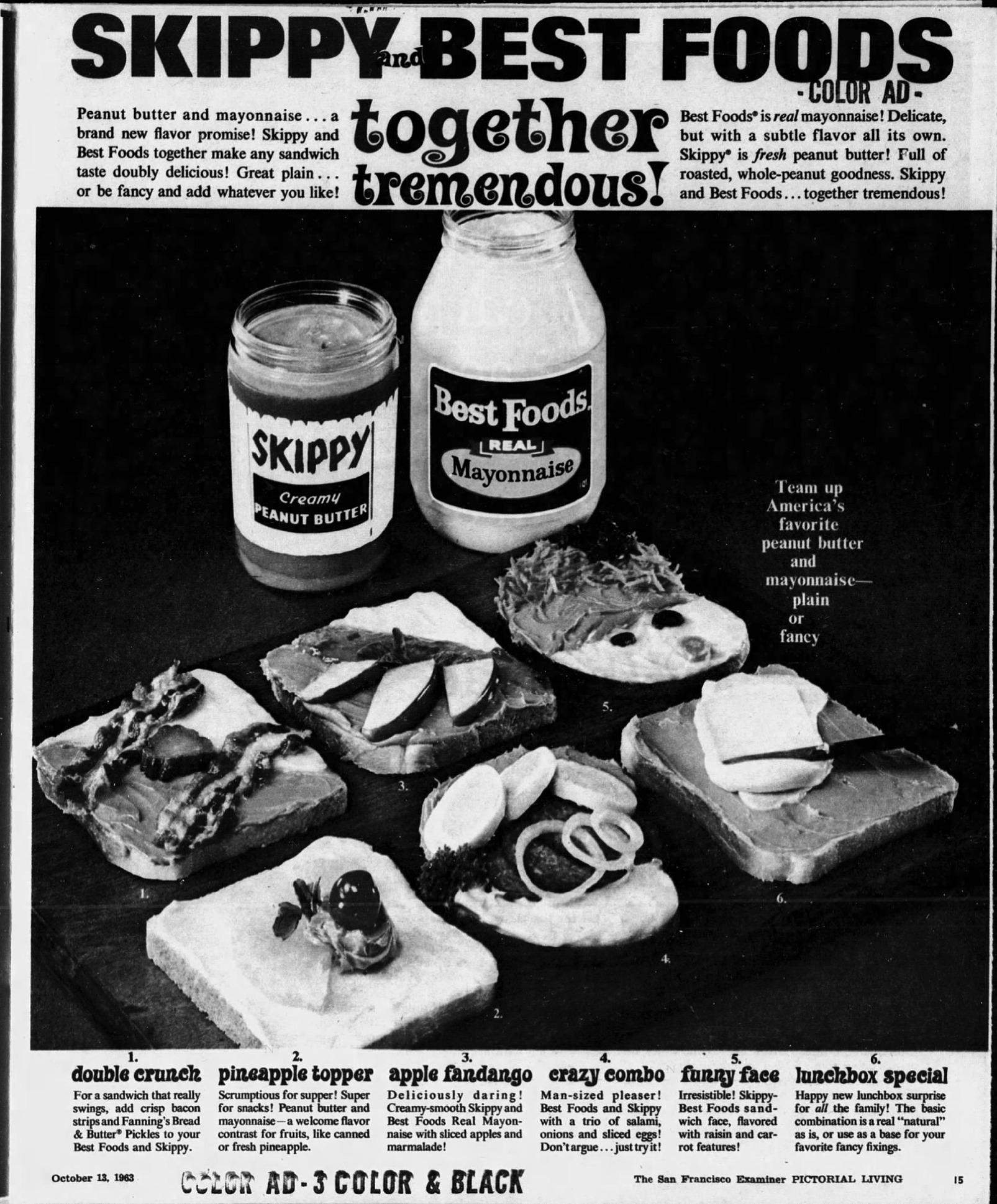
San Francisco Examiner - Oct 13, 1963
Posted By: Alex - Mon Sep 02, 2019 -
Comments (6)
Category: Food, 1960s
Happy Labor Day 2019!
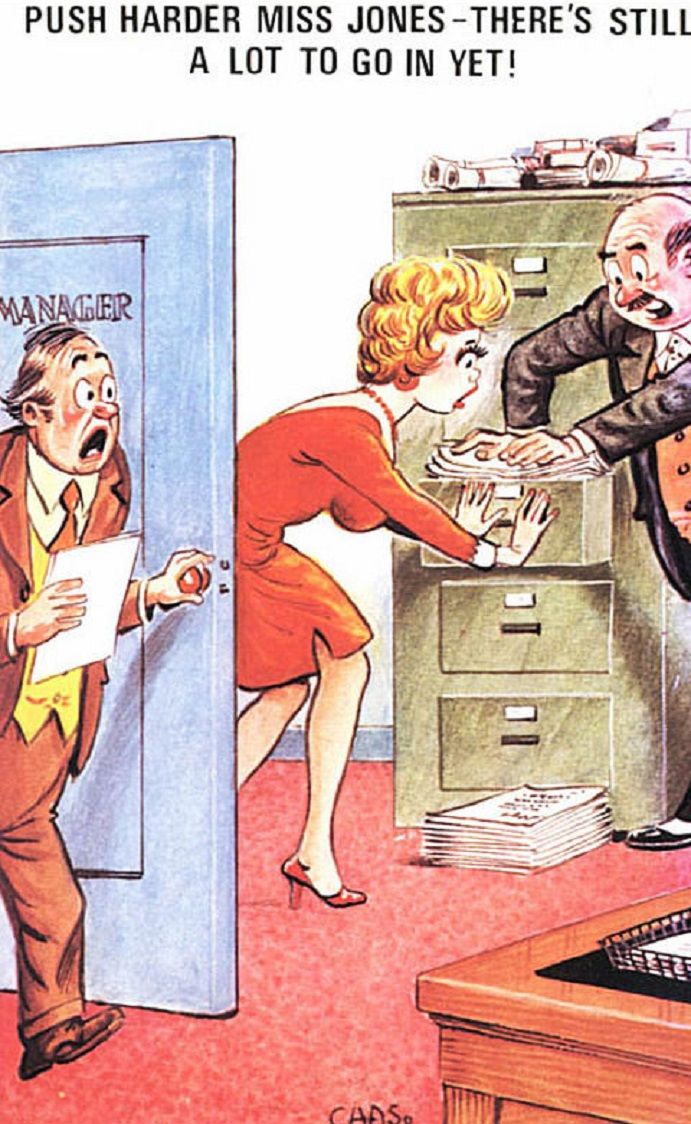
Posted By: Paul - Mon Sep 02, 2019 -
Comments (1)
Category: Holidays, Jobs and Occupations
September 1, 2019
Thumb Boy
A human marvel!Pina, who has since been dubbed ‘Thumb Boy’, has now amassed almost 150k followers on the video-sharing app, with one of his videos achieving two million likes.
Source: Unilad
Posted By: Alex - Sun Sep 01, 2019 -
Comments (2)
Category: Human Marvels
| Get WU Posts by Email | |
|---|---|

| Who We Are |
|---|
| Alex Boese Alex is the creator and curator of the Museum of Hoaxes. He's also the author of various weird, non-fiction books such as Elephants on Acid. Paul Di Filippo Paul has been paid to put weird ideas into fictional form for over thirty years, in his career as a noted science fiction writer. He has recently begun blogging on many curious topics with three fellow writers at The Inferior 4+1. Chuck Shepherd Chuck is the purveyor of News of the Weird, the syndicated column which for decades has set the gold-standard for reporting on oddities and the bizarre. Our banner was drawn by the legendary underground cartoonist Rick Altergott. Contact Us |
